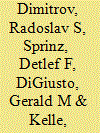| Srl | Item |
| 1 |
ID:
079940


|
|
|
|
|
| Publication |
2007.
|
| Summary/Abstract |
Why are multilateral institutions absent from some areas of international relations? Governments have not concluded regulatory policy agreements on tactical nuclear weapons and small arms control, deforestation, information privacy, and other transnational issues. The absence of regimes in such policy arenas is an empirical phenomenon with considerable theoretical and policy implications. Yet, existing scholarship on global governance largely ignores the instances in which such institutions do not emerge. This essay develops a research agenda to extend and strengthen regime theory through analysis of nonregimes. We articulate the concept, draw a typology of nonregimes, discuss the contributions that nonregime studies can make to IR theory, outline methodological approaches to pursue the proposed agenda, and highlight a priori theoretical considerations to guide such research. Six illustrative cases in the realms of arms control, environmental management, and international political economy are described and used to make preliminary observations of factors that impede regime formation
|
|
|
|
|
|
|
|
|
|
|
|
|
|
|
|
| 2 |
ID:
079939


|
|
|
|
|
| Publication |
2007.
|
| Summary/Abstract |
The relevance of regional security theories has grown in the wake of the Cold War. The global system has more participants-is less Eurocentric with Third World states having greater autonomy and involvement-and clearly unipolar, shifting the locus of conflict down from the global level. A new wave of regionalist scholarship has arisen in response. This review identifies this literature's central themes and suggested new variables. Its foundational and most contested challenge to international relations (IR) theory revolves around the autonomy of a regional level of analysis between the state and the globe. Accepting such autonomy, the literature broadly settles on three variables specific to regional structures. First, regional subsystems are porous. Intervention from above can overlay local dynamics. Second, proximity qualifies the security dilemma dramatically. Most states only threaten their neighbors, thus creating meaningful and distinct regional dynamics. Third, weak state-dominant regional complexes generate a shared internal security dilemma that trumps the external one. Regional organizations serve to repress shared centrifugal threats through pooled rather than ceded sovereignty
|
|
|
|
|
|
|
|
|
|
|
|
|
|
|
|
| 3 |
ID:
079938


|
|
|
|
|
| Publication |
2007.
|
| Summary/Abstract |
This essay examines a proposition made in the literature that there are three waves in globalization theory-the globalist, skeptical, and postskeptical or transformational waves-and argues that this division requires a new look. The essay is a critique of the third of these waves and its relationship with the second wave. Contributors to the third wave not only defend the idea of globalization from criticism by the skeptics but also try to construct a more complex and qualified theory of globalization than provided by first-wave accounts. The argument made here is that third-wave authors come to conclusions that try to defend globalization yet include qualifications that in practice reaffirm skeptical claims. This feature of the literature has been overlooked in debates and the aim of this essay is to revisit the literature and identify as well as discuss this problem. Such a presentation has political implications. Third wavers propose globalist cosmopolitan democracy when the substance of their arguments does more in practice to bolster the skeptical view of politics based on inequality and conflict, nation-states and regional blocs, and alliances of common interest or ideology rather than cosmopolitan global structures
|
|
|
|
|
|
|
|
|
|
|
|
|
|
|
|